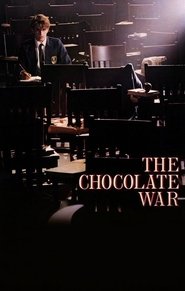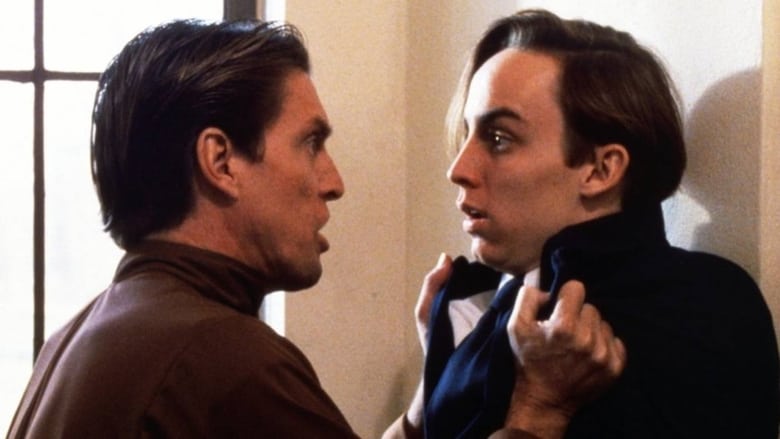“The Chocolate War” is a 1988 film that serves as a metaphorical exploration of power dynamics and rebellion in a high school setting. Following the story of Jerry Renault, the film dives into the dark and oppressive world of adolescent politics. With its gritty realism and uncompromising portrayal of social hierarchies, it challenges societal norms and exposes the harsh realities of conformity. Amidst this chocolate-smeared world, Jerry wages a solitary battle against a corrupt authority, forcing viewers to question their own place in a system that demands unquestioning obedience. This visually striking masterpiece is a thought-provoking examination of individuality and the price one pays for resisting societal pressures.

CLICK HERE⭭⭭⭭🍿_Watch The Chocolate War 1988 English Subtitles_
Review
In the realm of cinema, there are few stories that can transport us to a world brimming with both sweetness and darkness. One such tale is the remarkable movie “The Chocolate War,” a riveting adaptation of Robert Cormier’s celebrated novel. Directed by Keith Gordon, this 1988 gem has stood the test of time as a poignant exploration of teenage rebellion, power struggles, and the cost of standing up for what you believe in.
Set in an all-boys Catholic high school, “The Chocolate War” delves into the lives of its students who grapple with authority figures and societal norms. At the center of this heart-wrenching plot lies Jerry Renault, portrayed by a young and charismatic actor named Ilan Mitchell-Smith. As Jerry navigates his way through an environment fraught with peer pressure and manipulation, he becomes entangled in a battle against archaic traditions.
One can’t help but be mesmerized by Mitchell-Smith’s exceptional acting skills. His ability to convey Jerry’s inner turmoil is awe-inspiring, as he seamlessly brings forth the character’s vulnerability and resilience. In one scene that will forever be etched in our minds, Jerry faces a difficult decision – whether to sell chocolates for his school or join The Vigils, a secret society that controls the student body. Through Mitchell-Smith’s artistry, we witness Jerry’s courage radiate from his very core.
Behind every great film lies the devoted work of talented crew members who breathe life into every frame. With “The Chocolate War,” cinematographer Tom Richmond truly captured the essence of Cormier’s words onscreen. From dimly lit corridors to vibrant classroom scenes bursting with adolescent energy, Richmond’s camera work flawlessly encapsulates the atmosphere within Trinity High School.
Moreover, Gordon masterfully orchestrated each shot to convey both intimacy and claustrophobia simultaneously – providing viewers with an array of emotions throughout their journey in this microcosm of high school life. Moments of eeriness are met with heart-pounding tension, leaving audiences on the edge of their seats as they anticipate what lies ahead for Jerry and his peers.
The film’s score, composed by Michael Convertino, is hauntingly beautiful. Its melodies blend seamlessly with the narrative, adding layers of depth to every scene. Convertino’s delicate mix of strings and piano subtly underscores the fragility of Jerry’s fight against conformity and acts as a reminder that even in the face of adversity, beauty can still be found.
Not only did “The Chocolate War” captivate audiences worldwide, but it also sparked important discussions about conformity, bullying, and ethical dilemmas. Its release came at a time when movies addressing the struggles faced by teenagers were scarce – making it a beacon that inspired countless filmmakers to explore these themes in greater depth.
Over the years, “The Chocolate War” has garnered critical acclaim for its unflinching portrayal of teenage rebellion. It received numerous accolades including nominations for Best Director and Best Adapted Screenplay at the Independent Spirit Awards. However, this masterpiece remains an underrated gem deserving of more recognition in the annals of cinema history.
In spite of its undeniable brilliance, “The Chocolate War” also faced its fair share of criticism upon release. Some argued that it highlighted a dark side to teenagers that was neither relatable nor representative. Nonetheless, it is precisely through exploring society’s darkest corners that we can shed light on uncomfortable truths and prompt change – making this film an essential part of any cinematic discussion on adolescence.
As we delve into the production behind “The Chocolate War,” it becomes evident that every detail was meticulously crafted to enhance our viewing experience. From set design to costume choices, every aspect works harmoniously to immerse audiences in this turbulent world. The dedication and passion exhibited by all involved in this project are palpable throughout each frame.
In conclusion, “The Chocolate War” is a masterpiece that continues to mesmerize and challenge viewers with its thought-provoking tale. From its exceptional cast to its stunning cinematography, this film is a testament to the power of storytelling and the profound impact it can have on our lives. As we witness Jerry Renault’s journey unfold before our eyes, we are encouraged to question authority, challenge societal norms, and stand up for what truly matters – even if it means going against the grain.
“The Chocolate War” serves as a heartfelt reminder that sometimes, the most significant battles are fought not with fists or weapons but rather with the strength of character and unwavering determination.
Technical Data

- Release : 1988-11-18
- Runtime : 100
- Genre : Drama
- Cast : John Glover as Brother Leon, Ilan Mitchell-Smith as Jerry, Wallace Langham as Archie, Doug Hutchison as Obie, Corey Gunnestad as Goober
- Crew : Tom Richmond as Director of Photography, Keith Gordon as Director, Keith Gordon as Writer, Robert Cormier as Novel
- Revenue : $303,624
- Budget : 0
- Company : Management Company Entertainment Group (MCEG)
- Popularity : 4.189
- Summary : A surreal portrait of a Catholic Private School and its hierarchy. A new student must submit to the bizarre rituals of his peers and the expectations of the school’s administration by selling chocolates.
- Tagline : Sometimes revenge is bitter, not sweet.
